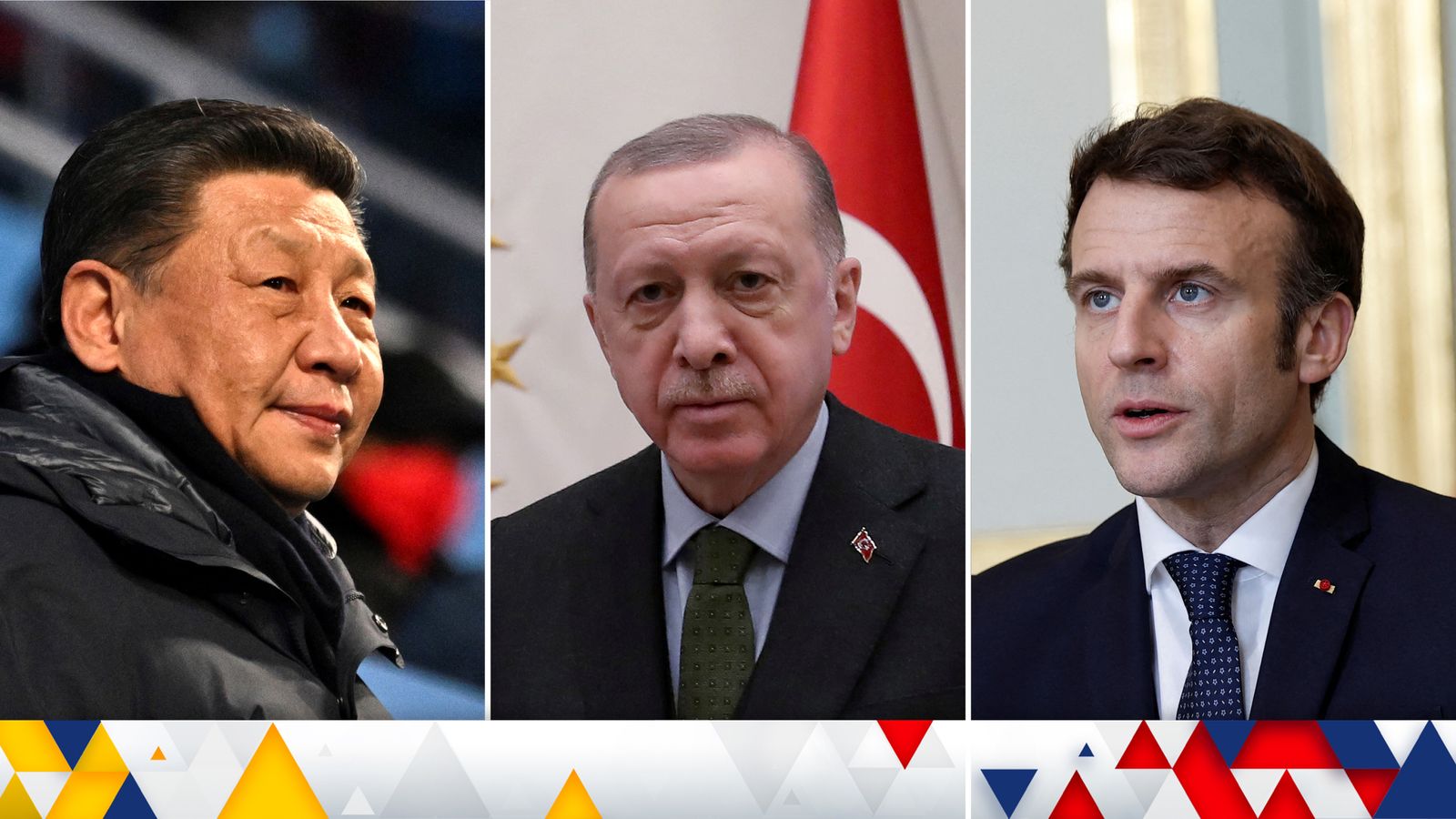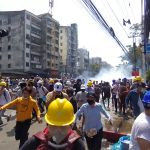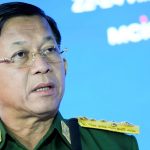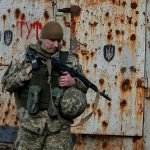A third round of talks between Russia and Ukraine ended in no major breakthroughs this week.
Moscow’s head negotiator Vladimir Medinsky said the latest discussions between the two sides were “not easy” and it is “too early to talk about something positive”.
The Kremlin has promised a total ceasefire if Ukraine agrees never to join NATO and to recognise the occupied territories of Crimea, Donetsk and Luhansk as independent.
Russia also claims it will stop attacking the country if Ukraine ceases military action.
1,200 dead in ‘apocalyptic’ city; follow Ukraine updates live
Please use Chrome browser for a more accessible video player
But Ukrainian President Volodymyr Zelenskyy shows no signs of backing down, addressing the House of Commons directly – as well as other Western leaders – with calls asking them to intervene against Russian forces.
While only small concessions have been made on humanitarian corridors for people trying to flee, intense shelling of Ukrainian cities means hundreds more lives continue to be lost.
Ukraine war: Home Office confirms new UK visa centre in Lille will not accept walk-in applications from Ukrainian refugees
Ukraine war: Moscow says it has found biological weapons in Ukraine – but US dismisses claims as ‘absurd propaganda’
Ukraine war: Children buried under rubble after Russian airstrike hit maternity hospital in Mariupol, President Zelenskyy says
Here Sky News looks at the countries that could help broker an end to the conflict.
Turkey
On Thursday, Russian foreign minister Sergei Lavrov will meet his Ukrainian counterpart Dmytro Kuleba for the first time since the invasion began.
The pair are having a trilateral meeting with Turkish foreign minister Mevlut Cavusoglu on the sidelines of an international diplomacy forum already happening in Antalya.
It came after Turkish President Recep Tayyip Erdogan called Vladimir Putin on Sunday to make a fresh offer to host talks, according to Mr Cavusoglu.
Mr Erdogan was one of the first to make himself known as a potential mediator – offering to host Mr Zelenskyy and Mr Putin at a summit in early February – before troops crossed the border.
Subscribe to the Daily podcast on Apple Podcasts, Google Podcasts, Spotify, Spreaker
Turkey shares a maritime border in the Black Sea with Ukraine and Russia and enjoys good relations with both countries.
This year it brokered a free trade agreement with Ukraine and agreed for Turkish-designed drones to be produced there.
But equally, Moscow is one of Ankara’s biggest trading partners and supplies it with the majority of its oil and gas.
Mr Erdogan has also bought military equipment from Russia and used his good relations with the Kremlin for leverage, threatening Western allies he could quit NATO.
Asked about Thursday’s talks, Mr Cavusoglu said: “We especially hope that this meeting is a turning point and… an important step towards peace and stability.”
China
As a friend of Russia, China has refused to condemn the invasion, claiming instead that its “security concerns” are “legitimate” and sanctions against it are “illegal”.
President Xi Jinping hosted his Russian counterpart at the opening of the Beijing Olympics, with his foreign minister Wang Yi describing the two countries’ relationship as “iron clad”.
China abstained from the UN Security Council motion on the invasion, but has made little noise since.
Speaking at a virtual meeting with his French and German counterparts Emmanuel Macron and Olaf Scholz on Tuesday, Mr Xi said China would “jointly” support peace talks between Russia and Ukraine.
But CIA director Williams has claimed China is feeling “unsettled” by the ongoing war and how it has united Europe and the US more strongly than before.
“They did not anticipate the significant difficulties the Russians were going to run into,” he told Congress.
Professor Shi Yinhong, an international relations expert at Renmin University and adviser to the Chinese government, told Sky News China is “embarrassed” by what is happening in Ukraine.
Australian PM Scott Morrison has claimed: “No country will have a bigger impact on concluding this terrible war in Ukraine than China.”
Israel
After a surprise visit to Moscow on 5 March, Israeli Prime Minister Naftali Bennett has positioned himself as a mediator between the two sides.
Israel has a good working relationship with both Russia and Ukraine and if successful, brokering a ceasefire could be the making of Mr Bennett’s short political career.
He was criticised for not sanctioning Russia in the run-up to the invasion, while his Western allies tightened measures.
But after troops crossed the border, Israel delivered hundreds of tons of humanitarian aid to Ukraine and vowed to fund a field hospital there.
Ukraine is home to around 200,000 Jews, including President Zelenskyy himself.
Meanwhile Mr Bennett is believed to have kept up communication with both countries, with Mr Zelenskyy reported to have asked him to negotiate.
Read more:
Who is winning the war in Ukraine?
What sanctions are being imposed on Russia and will they work?
Why has Putin invaded Ukraine?
Israel’s military ties with Russia are incredibly tight, however. It relies on Moscow for security coordination in Syria and for help with negotiating Iran’s nuclear deal, where in Vienna, a deal is imminent.
According to the Jerusalem Post, Kyiv has played down its willingness to consider Mr Putin’s demands.
In a recent article, the newspaper claimed Saturday’s meeting between Mr Putin and Mr Bennett revealed the “gaps between the sides are not great”.
But Israeli commentator Barak Ravid was more sceptical of Mr Bennett’s success so far: “The prime minister has waded into the Ukrainian mud without knowing entirely just how deep it is.”
France
French President Emmanuel Macron is one of the only Western leaders to keep an open line to Vladimir Putin.
He has spoken directly with his Russian counterpart four times since the start of the invasion and more than 10 times over the past month.
Mr Macron has also conveyed messages on behalf of President Zelenskyy, trying to broker small deals on local ceasefires and human corridors.
After one phone call, an Elysee Palace spokesperson said both leaders’ interpreters use the familiar ‘tu’ instead of the more formal ‘vous’ for one another.
During their most recent conversation, Mr Macron received assurances from Mr Putin on Ukraine’s seized nuclear plants at Chernobyl and Zaporizhzhia.
Benjamin Haddad, a senior director for Europe at the Atlantic Council in Paris and a member of Mr Macron’s En Marche party, said his boss is under “no illusion Putin will keep his word on anything he promises”.
But keeping him engaged leaves Mr Putin with the option of de-escalation, he says.
Many on the global stage have mocked Mr Macron’s ‘naivety’ in trying to maintain relations with Mr Putin, and Mr Putin’s decision to only offer humanitarian corridors to Russia and Belarus suggest his negotiations have fallen short of success.
Other countries
A number of other countries, which abstained from the UN Security Council motion and have good relations with Russia, have remained largely out of the conflict.
Brazilian President Jair Bolsonaro said he “stood in solidarity with Russia”, but did not elaborate beyond that.
His foreign minister Carlos Franca said: “Brazil’s position is clear… We are on the side of world peace.
“We think we can reach that (peace)… by helping to find a way out (of the war), not by taking sides.”
India and Pakistan have come also come under increasing pressure to condemn the invasion, but their strategic ties to Russia appear to have prevented them from doing so.
Saudi Arabia, the UAE and a number of African nations also abstained at the UN – but are not thought to have enough clout with the West to help broker negotiations with Ukraine.






















